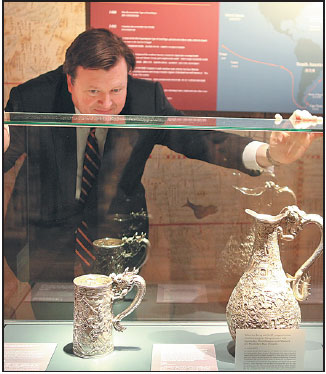Hamburg museum shows relevance of ancient Silk Road
As diplomatic activity reaches a high pitch in Germany - with the arrival of President Xi Jinping in Berlinfor a state visit starting on Tuesday, to be followed by the G20 Summit of the leaders of major economies in Hamburg on Friday and Saturday - one German museum director is inviting the honored guests to take a moment to relax with some cultural delights for the eyes.
A bonus is that the delights also relate to what they are discussing, especially in terms of the China-proposed Belt and Road Initiative.
Peter Tamm, director of the International Maritime Museum in Hamburg, is offering a display of up to 120 items chronicling the history of China's maritime Silk Road.
"The leaders should come to know how different cultures and civilizations conducted exchanges and understanding in an amazingly peaceful way during the period," Tamm said at the museum, which is in the heart of the port city.
"The items show the unbelievable achievements China made in those years."
The exhibition, being held to September, was jointly arranged by Tamm's museum and the Guangdong Museum of Guangdong province. The items will be moved to Rome for exhibition later this year.
The maritime Silk Road exhibition includes relics and information about shipwrecks, displays about items traded such as porcelain and plants, and the evidence of the influences that also were carried along trade routes such as religions and cultures.
"We are thrilled to have this exhibition and we are happy that more and more museumgoers are interested in Chinese culture and Silk Road history," said Tamm.
Tamm, deeply involved in shipping brokerage, media and culture businesses, said the exhibit is evidence of the interest that Germans, and Europeans in general, have in Chinese history and cultures.
Tamm said all the items are treasures and he is extremely impressed by such unique relics as those from the Nanhai One, a merchant ship that sank off the coast of southern China during the Song Dynasty (960-1279). The colossal ship was among those used to bring China and the rest of world closer by trading - carrying such goods as porcelain and coins - and through cultural exchanges.
"They are symbolic of a period in China's history that is little known here in Germany," said Tamm. "The routes were used during the Middle Ages to bring luxury goods from China to the Middle East and from there on to Europe," he said.
Tamm said the exhibition helps explain the Belt and Road Initiative, a primary part of which is the 21st Century Maritime Silk Road.
Tamm's museum and Guangzhou Museum have also produced a book in German and English to introduce the history and items in the exhibition.
In the preface, Minister of Culture Luo Shugang, said that through exhibits depicting cultural and commodity exchanges, relics and underwater archaeology, the exhibition shows the progress realized across oceans between different civilizations in ancient times.
"I am certain that this exhibition will contribute to the further understanding between China and Germany," Luo wrote.
fujing@chinadaily.com.cn
|
|
(China Daily 07/06/2017 page3)

























